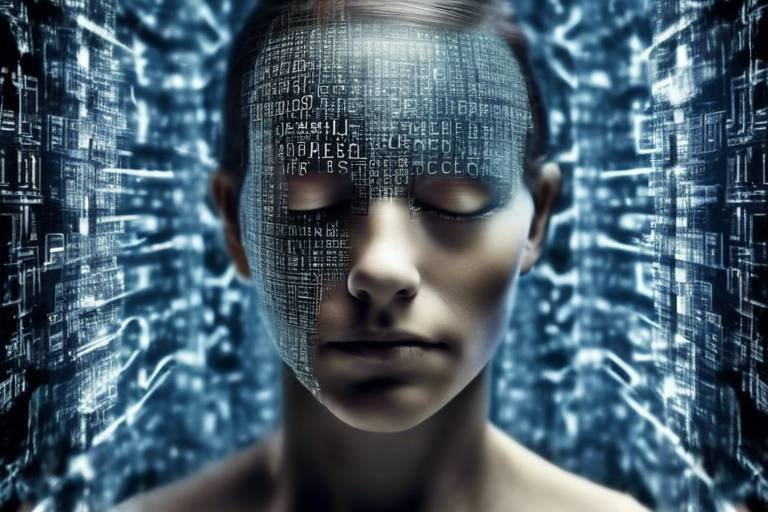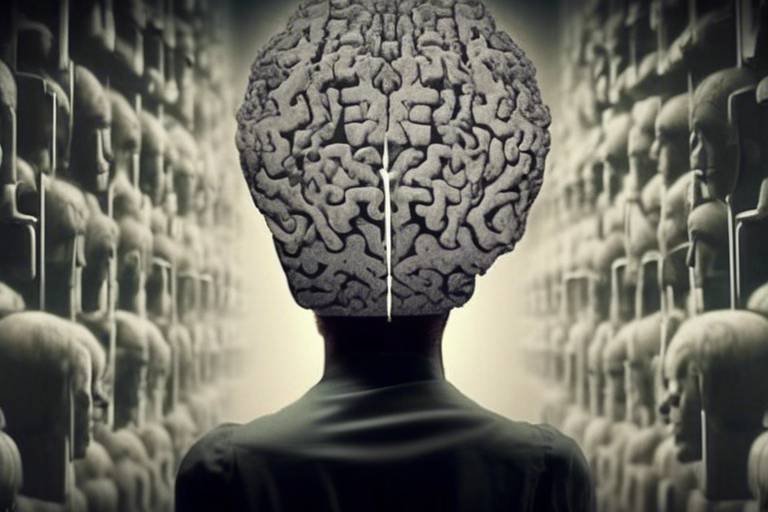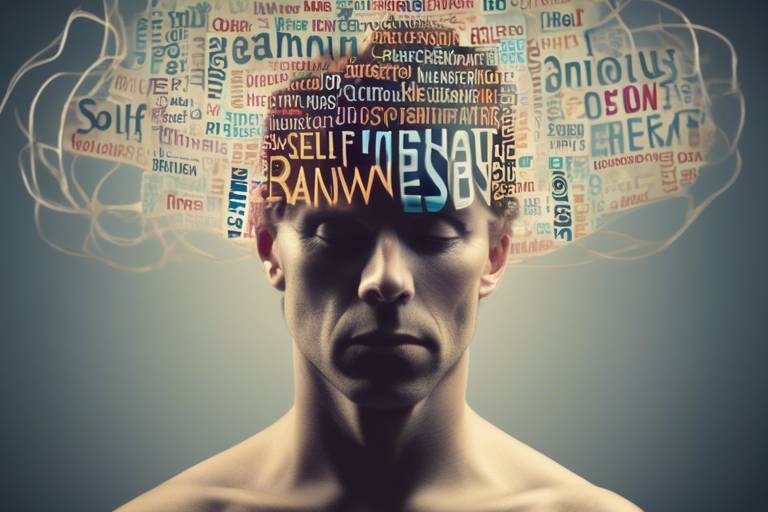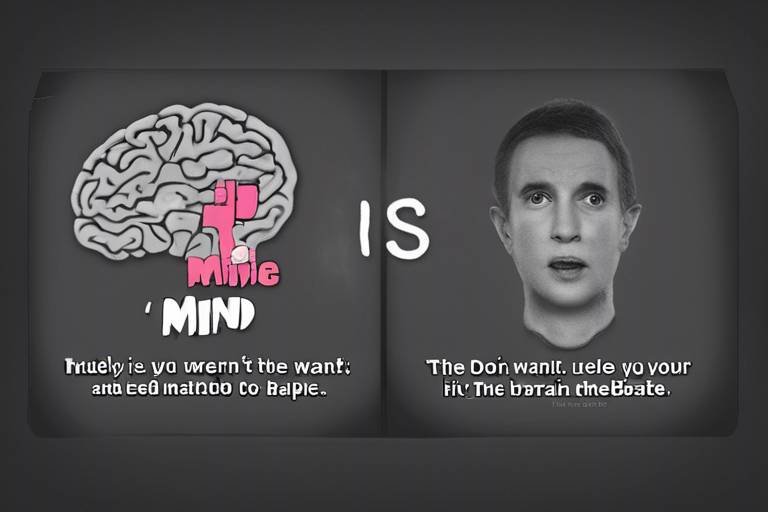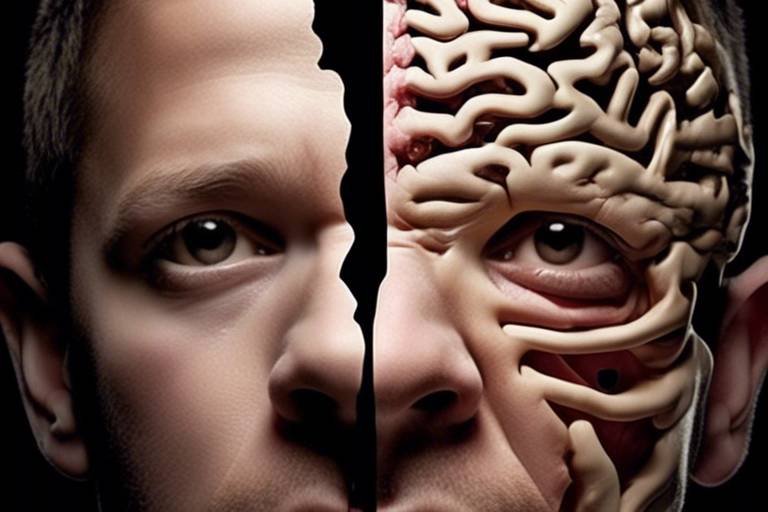The Intersection of Philosophy and Neuroscience
Have you ever pondered over the mysteries of the mind? The intersection of philosophy and neuroscience is a fascinating realm where deep questions about consciousness, free will, and morality collide with scientific inquiry. These two fields, seemingly distinct, actually share a rich dialogue that enhances our understanding of what it means to be human. Imagine philosophy as a vast ocean of ideas and neuroscience as the intricate vessels navigating through it, seeking to uncover the treasures hidden beneath the surface. Together, they explore the essence of our thoughts, emotions, and behaviors, inviting us to reflect on our existence in profound ways.
At the heart of this intersection lies the concept of consciousness. For centuries, philosophers have wrestled with questions like: What is consciousness? How does it arise? Neuroscience, with its advanced imaging technologies and experimental methods, is now shedding light on these age-old questions. By examining brain activity, scientists are beginning to map out the neural correlates of consciousness, providing a biological foundation for philosophical theories. This collaboration between disciplines not only enriches our understanding but also challenges us to rethink our assumptions about the mind.
Another significant aspect of this intersection is the debate between free will and determinism. Philosophers have long argued whether our choices are truly our own or if they are predetermined by prior causes. Neuroscience adds a compelling layer to this discussion by revealing how brain processes influence decision-making. As we delve deeper into the workings of the brain, we are confronted with questions about human agency and the extent to which we can be held morally responsible for our actions. This interplay raises critical questions about ethics and accountability in a world increasingly informed by scientific understanding.
Moreover, the mind-body problem remains a cornerstone of both philosophical and neuroscientific inquiry. The classic debate between dualism—the idea that mind and body are separate—and physicalism—the belief that they are unified—continues to provoke thought and discussion. Recent advancements in neuroscience, such as the study of brain plasticity and the effects of neurochemical processes on behavior, lend support to physicalist perspectives, suggesting that our mental states are deeply rooted in our biological makeup. This evolving conversation not only deepens our understanding of identity and consciousness but also challenges us to reconsider the very nature of what it means to be a person.
As we navigate this complex landscape, the implications for ethics and morality become increasingly apparent. Neuroscience’s insights into how the brain processes moral judgments can reshape our understanding of ethical theories. For instance, if our moral decisions are influenced by neural mechanisms, what does that mean for concepts like responsibility and accountability? The dialogue between philosophy and neuroscience invites us to explore how our understanding of the brain affects our views on punishment, justice, and rehabilitation, leading to a more nuanced approach to moral philosophy.
In conclusion, the intersection of philosophy and neuroscience is not merely an academic exercise; it is a vibrant and dynamic conversation that shapes our understanding of the mind, behavior, and ethics. As we continue to explore this rich terrain, we are reminded that the questions we ask and the answers we seek are as much about our humanity as they are about the science that seeks to explain it.
- What is the main focus of the intersection between philosophy and neuroscience?
The main focus lies in understanding consciousness, free will, and moral responsibility, and how these concepts are informed by neuroscientific research. - How does neuroscience challenge traditional philosophical views?
Neuroscience provides empirical evidence that can affirm or contradict philosophical theories, particularly regarding free will and the nature of consciousness. - What is neuroethics?
Neuroethics is a field that examines the ethical implications of neuroscientific research and its impact on our understanding of morality and responsibility. - Can neuroscience provide answers to philosophical questions?
While neuroscience can offer insights and data, many philosophical questions remain complex and may not have definitive answers.

The Nature of Consciousness
Consciousness is a puzzle that has intrigued philosophers, scientists, and thinkers for centuries. What exactly is it? How does it arise? These questions are not just academic; they touch on the very essence of what it means to be human. The nature of consciousness is a complex tapestry woven from threads of subjective experience, cognitive processes, and neurological functions. Philosophers like Descartes famously pondered, "I think, therefore I am," highlighting the intimate connection between thought and existence. Yet, as neuroscience advances, we find ourselves at a fascinating crossroads where ancient philosophical inquiries meet cutting-edge scientific discoveries.
Different theories of consciousness have emerged, each offering unique insights. For instance, the materialist view posits that consciousness is a product of physical processes in the brain, while idealism suggests that consciousness is fundamental and shapes reality. Then there’s the panpsychism perspective, which argues that consciousness is a property of all matter, extending even to inanimate objects. Each theory presents compelling arguments, yet none can fully encapsulate the rich and profound experience of being conscious.
Neuroscience has made significant strides in understanding the brain's role in consciousness. Recent studies have identified specific brain regions, such as the prefrontal cortex and the thalamus, that are crucial for conscious thought and awareness. These findings challenge some philosophical perspectives while supporting others. For example, the identification of neural correlates of consciousness (NCC) suggests that specific brain activities correspond to conscious experiences, leading to a more materialistic understanding of the mind.
However, the relationship between neuroscience and philosophy is not merely one of contradiction but rather a dialogue that enriches both fields. Philosophers argue that while neuroscience can describe the mechanisms behind consciousness, it may not fully explain the qualitative aspects of experience—what it feels like to be aware. This divide leads to questions about the qualia—the individual instances of subjective experience. For instance, how can we scientifically measure the experience of seeing the color red or tasting chocolate? These experiences elude straightforward scientific quantification, indicating that consciousness encompasses more than just brain activity.
As we navigate this intricate landscape, we must also consider the implications of our findings. If consciousness is indeed a product of neural processes, what does that mean for our understanding of self and identity? Are we merely biological machines, or is there something more profound at play? These questions resonate deeply within both philosophical and neuroscientific communities, prompting ongoing exploration and debate.
In summary, the nature of consciousness remains one of the most compelling and challenging topics at the intersection of philosophy and neuroscience. As we delve deeper into the workings of the brain, we uncover layers of complexity that challenge our understanding of self, reality, and existence. The journey to comprehend consciousness is far from over, and it promises to reveal even more surprising insights in the future.

Free Will and Determinism
The debate over free will versus determinism is one of the most profound questions in both philosophy and neuroscience. At its core, this discussion grapples with whether humans have the capacity to make choices independent of external influences or if our actions are predetermined by a series of biological, environmental, and social factors. This clash of ideas can feel like a tug-of-war between the belief in human agency and the acceptance of a universe governed by cause and effect.
Neuroscience has made significant strides in understanding the brain's functioning, and this has profound implications for our understanding of free will. For instance, when we think about making a decision, we often perceive ourselves as the ultimate decision-makers. However, neuroscientific research suggests that our brains may initiate actions before we consciously decide to act. This raises the question: if our brain is making decisions for us, do we truly have free will?
To explore this further, consider the following points:
- Neuroscientific Findings: Studies indicate that brain activity related to decision-making can be detected several seconds before we become consciously aware of our choice. This suggests that our sense of agency might be an illusion.
- Philosophical Implications: If our decisions are predetermined by neural processes, what does that mean for our moral responsibility? Are we accountable for actions that our brains have already decided upon?
- Ethical Considerations: The implications of these findings stretch into ethics, challenging traditional views on punishment and reward. If free will is an illusion, how do we approach concepts like justice and rehabilitation?
As we delve deeper into this topic, it's essential to recognize that the implications of neuroscience on free will do not diminish the complexity of human experience. While our brains may operate within certain parameters, the richness of human thought, emotion, and interaction cannot be easily reduced to mere biological processes. This ongoing dialogue between neuroscience and philosophy invites us to reconsider our understanding of agency, responsibility, and what it means to be human.
In the end, the intersection of free will and determinism poses more questions than answers. It challenges us to reflect on our beliefs about choice and accountability, pushing the boundaries of how we understand ourselves and our place in the universe. As we continue to explore these themes, the conversation between philosophy and neuroscience will undoubtedly evolve, offering new insights into the nature of consciousness and human behavior.
- What is free will? Free will refers to the ability of individuals to make choices that are not determined by prior causes or divine intervention.
- What is determinism? Determinism is the philosophical belief that all events, including moral choices, are determined completely by previously existing causes.
- How does neuroscience affect our understanding of free will? Neuroscience suggests that many of our decisions are made by the brain before we consciously feel we have made them, which challenges traditional notions of free will.
- Can we be held morally responsible if free will is an illusion? This is a contentious issue; some argue that moral responsibility is still valid, while others believe it needs to be redefined in light of neuroscientific findings.

Neuroscientific Evidence
In the fascinating realm of neuroscience, a plethora of studies have emerged, challenging our traditional views on free will and decision-making. One of the most compelling aspects of these findings is how they intersect with philosophical inquiries about human agency. Neuroscientific evidence suggests that our conscious decisions may not be as autonomous as we once believed. For instance, researchers have utilized advanced imaging techniques to observe brain activity in real-time, revealing that our brains often initiate actions before we are consciously aware of them. This phenomenon raises profound questions: Are we truly in control of our choices, or are we merely following a script written by our neural pathways?
Consider the implications of this research. When individuals make a choice, their brains often display patterns of activity that precede their conscious awareness of that choice. In a landmark study, subjects were asked to decide when to press a button while their brain activity was monitored. The results indicated that neural signals predicting the decision occurred several seconds before the subjects reported being consciously aware of their intention to act. This raises the provocative question of whether our sense of free will is merely an illusion, a post-hoc rationalization of decisions already made by our brains.
To illustrate the depth of this inquiry, let’s delve into a few key experiments that have shaped our understanding:
- Libet's Experiment: This classic study, conducted by neuroscientist Benjamin Libet, found that brain activity indicating a decision to move occurred approximately 500 milliseconds before participants consciously reported their decision. This suggests that the brain may be 'deciding' before we are even aware of it.
- Readiness Potential: The term 'readiness potential' refers to the brain's electrical activity that occurs before a voluntary movement. This has been observed in various studies, indicating that the brain prepares for action well before conscious awareness.
- Neuroscientific Insights on Impulse Control: Research shows that areas of the brain associated with impulse control activate differently when making spontaneous versus deliberative choices, revealing the complexity of decision-making processes.
These findings have sparked intense debate among philosophers and neuroscientists alike. Some argue that if our decisions are predetermined by neural activity, then the concept of moral responsibility must be re-evaluated. Others contend that even if our decisions are influenced by unconscious processes, we still possess the capacity for rational thought and reflection, which can guide our actions. This ongoing dialogue underscores the intricate relationship between neuroscience and philosophy, as each discipline grapples with the implications of these revelations.
As we navigate this complex landscape, it becomes increasingly important to consider how neuroscientific evidence might reshape our understanding of free will. Are we merely puppets of our biology, or do we retain the ability to shape our destinies? The answers to these questions may not only redefine concepts of human agency but also influence broader societal norms regarding accountability and ethical behavior.
In summary, the intersection of neuroscience and philosophy offers a rich tapestry of ideas that challenge our preconceived notions of free will. As new research emerges, it will be crucial to remain open to the evolving understanding of how our brains function and how that impacts our perception of choice and responsibility.
- What is the significance of Libet's experiment? Libet's experiment is significant because it suggests that unconscious brain processes may precede conscious decisions, challenging traditional notions of free will.
- How does neuroscience impact our understanding of moral responsibility? Neuroscience impacts our understanding of moral responsibility by suggesting that if our decisions are influenced by brain activity beyond our awareness, it complicates the notion of accountability for our actions.
- Can we still have free will if our choices are influenced by brain activity? Many philosophers argue that even if our choices are influenced by brain activity, we still possess the capacity for rational thought and reflective decision-making, allowing for a form of free will.

Libet's Experiment
Libet's experiment, conducted in the early 1980s, is a fascinating study that has sparked extensive debate in both neuroscience and philosophy. The core of the experiment revolves around the question of when we become consciously aware of our decisions. Participants were asked to perform a simple motor task: they had to flex their wrist at a time of their choosing while also noting the position of a dot on a clock at the moment they felt the urge to move. What Libet discovered was astonishing: there was a measurable brain activity, known as the readiness potential, that occurred several hundred milliseconds before the participants reported being consciously aware of their decision to act.
This finding raises profound implications for our understanding of free will. If our brains are already preparing to act before we consciously decide to do so, can we truly claim to have free will? Or are our decisions merely the result of unconscious processes? This leads to a cascade of questions about human agency and responsibility. If our actions are predetermined by brain activity that we are not aware of, what does that mean for accountability in our moral and ethical frameworks?
Furthermore, the implications of Libet's findings extend beyond mere philosophical speculation. They challenge the traditional notion of self-control and the belief that we are the authors of our actions. In a sense, it feels as though our consciousness is playing catch-up with our brain's decisions, which can be quite unsettling. This realization can lead to a reevaluation of how we understand personal responsibility, as it suggests that much of our decision-making process might be occurring outside of our conscious awareness.
To better illustrate the timeline of Libet's experiment and its findings, here’s a simplified table:
| Event | Timeframe |
|---|---|
| Brain Activity (Readiness Potential) | 300-500 ms before conscious awareness |
| Conscious Decision to Move | 0 ms (when participant feels urge) |
| Physical Movement | After conscious decision |
The ramifications of Libet's experiment are profound. It has led to a variety of interpretations and responses from philosophers and scientists alike. Some argue that this evidence supports a deterministic view of human behavior, while others suggest that the conscious mind still plays a crucial role, albeit in a more complex and nuanced way than previously thought. This ongoing dialogue between neuroscience and philosophy continues to shape our understanding of the mind and its capabilities.
In conclusion, Libet's experiment not only challenges our notions of free will but also encourages a deeper exploration of the relationship between consciousness and the brain. As we delve further into the intricacies of the human mind, we must grapple with the implications of these findings on our understanding of morality, responsibility, and what it means to be human.

Neuroethics
Neuroethics is an exciting and rapidly evolving field that sits at the crossroads of neuroscience and ethical inquiry. As our understanding of the brain deepens through advanced imaging techniques and experimental research, we are confronted with a myriad of ethical questions that challenge our traditional views on free will, moral responsibility, and the very essence of what it means to be human. Imagine a world where our thoughts, decisions, and behaviors can be predicted or even manipulated based on neural activity. How does this shift our understanding of accountability and personal agency?
One of the central issues in neuroethics revolves around the implications of neuroscientific findings for concepts of free will and moral responsibility. If our choices can be traced back to specific brain processes, what does that mean for our legal systems, which are built on the assumption that individuals have the capacity to make free choices? This question is not merely academic; it has real-world implications for how we approach justice and rehabilitation. For instance, should someone be held accountable for a crime if their actions can be attributed to a neurological condition?
Furthermore, neuroethics examines the ethical considerations surrounding the use of neuroscience in various domains, including education, mental health, and criminal justice. As we develop techniques that can enhance cognitive abilities or modify behaviors, we must grapple with the moral ramifications of such interventions. Here are some key ethical concerns in neuroethics:
- Informed Consent: How can we ensure that individuals fully understand the implications of participating in neuroscientific research or undergoing treatment?
- Privacy: As our brains become more accessible through technology, how do we protect the privacy of our thoughts and mental processes?
- Equity: Will advancements in neuroscience lead to disparities in access to treatments and enhancements, exacerbating existing social inequalities?
Additionally, neuroethics prompts us to consider the long-term effects of manipulating brain functions. For example, if we can enhance certain cognitive abilities, what happens to the concept of personal achievement? Does it diminish our sense of self-worth if our abilities can be artificially enhanced or diminished? These questions highlight the need for a robust ethical framework to guide the application of neuroscientific advancements.
In conclusion, neuroethics serves as a crucial lens through which we can examine the implications of our growing understanding of the brain. As we continue to explore the depths of human consciousness and behavior, we must remain vigilant in addressing the ethical challenges that arise. The dialogue between neuroscience and ethics is not just about understanding the brain; it's about understanding ourselves and our place in the world.
- What is neuroethics? Neuroethics is the study of the ethical, legal, and social implications of neuroscience research and its applications.
- Why is neuroethics important? It helps us navigate the moral dilemmas that arise from advancements in neuroscience, particularly concerning free will, responsibility, and the treatment of mental health.
- How does neuroscience affect our understanding of free will? Neuroscience challenges traditional notions of free will by suggesting that many of our decisions may be influenced by unconscious brain processes.

Philosophical Perspectives
When it comes to the debate surrounding free will, the philosophical landscape is as diverse as it is complex. Different schools of thought offer varying interpretations of how free will interacts with the findings of neuroscience. Some philosophers firmly believe in the existence of free will, positing that individuals have the capacity to make choices independent of biological or environmental constraints. This perspective is often referred to as libertarianism, which asserts that human beings possess a unique ability to act contrary to deterministic influences.
On the other hand, we have compatibilists, who argue that free will and determinism are not mutually exclusive. They contend that even if our actions are determined by prior causes—such as genetics, upbringing, and neurobiological processes—this does not negate our ability to make choices. Compatibilists redefine free will in a way that aligns with determinism, suggesting that as long as a person's actions align with their desires and intentions, they can be considered free. This viewpoint is gaining traction as neuroscientific evidence continues to unveil the complex mechanisms behind decision-making.
However, the most challenging perspective comes from hard determinists. This school of thought argues that every event, including human actions, is determined by preceding events in accordance with the laws of nature. Hard determinists claim that the concept of free will is merely an illusion, a comforting narrative we tell ourselves to cope with the reality of our existence. The implications of this view are profound, raising questions about moral responsibility and ethical behavior. If our decisions are merely the result of neural processes and environmental stimuli, can we truly hold individuals accountable for their actions?
To illustrate this ongoing dialogue, consider the following table that summarizes the main philosophical perspectives on free will:
| Perspective | Core Belief |
|---|---|
| Libertarianism | Humans have free will and can make choices independent of determinism. |
| Compatibilism | Free will exists within a deterministic framework; choices align with desires. |
| Hard Determinism | All actions are predetermined; free will is an illusion. |
As we delve deeper into the intersection of philosophy and neuroscience, it becomes clear that these perspectives are not just academic exercises; they have real-world implications. For instance, if we lean towards the hard determinist view, how does that affect our legal system? Should we treat offenders as morally culpable, or should we focus on rehabilitation, given that their actions were predetermined? These questions challenge our traditional notions of justice and accountability.
In conclusion, the philosophical perspectives on free will are as varied as the human experience itself. As neuroscience continues to evolve, it will undoubtedly influence these philosophical debates, prompting us to reconsider our understanding of human agency and moral responsibility. The conversation is ongoing, and as we explore these complex issues, we must remain open to the insights that both fields can offer.
- What is the main debate between free will and determinism? The main debate centers around whether humans have the capacity to make choices independently of prior causes or if all actions are determined by preceding events.
- How does neuroscience influence our understanding of free will? Neuroscience provides insights into the brain's decision-making processes, which can challenge traditional notions of free will by suggesting that our choices may be influenced by biological factors.
- What are the implications of hard determinism for moral responsibility? Hard determinism raises questions about accountability, suggesting that if actions are predetermined, individuals may not be morally responsible for their behavior.

The Mind-Body Problem
The mind-body problem is one of the most enduring and perplexing dilemmas in both philosophy and neuroscience. At its core, this issue grapples with the relationship between our mental experiences—the thoughts, emotions, and consciousness we experience—and our physical bodies, particularly the brain. How can something as intangible as our thoughts emerge from the physical structure of the brain? This question has puzzled thinkers for centuries and continues to spark debate among philosophers and neuroscientists alike.
One of the most significant aspects of this discussion is the contrast between dualism and physicalism. Dualism, famously championed by René Descartes, posits that the mind and body are fundamentally different substances. According to this view, the mind exists independently of the physical realm, leading to intriguing implications about the nature of consciousness and identity. On the other hand, physicalism argues that everything about the mind can be explained in terms of physical processes. This perspective suggests that mental states are entirely dependent on, and even reducible to, brain states. Each viewpoint raises profound questions about what it means to be human and how we understand our own consciousness.
Recent advancements in neuroscience have provided fascinating insights that challenge traditional philosophical positions. For instance, studies have shown that certain brain activities can be correlated with thoughts and decisions before we are consciously aware of them. This evidence suggests that our consciousness may be a byproduct of complex neural processes rather than a separate entity. The implications of this are staggering: if our thoughts are merely the result of brain activity, what does that mean for our understanding of free will and personal identity? It’s almost as if we are characters in a play, with our actions scripted by the intricate workings of our brains.
Moreover, the concept of emergent properties plays a crucial role in this discussion. Some philosophers propose that consciousness arises from the complexity of brain processes—much like how a flock of birds exhibits coordinated movement that cannot be attributed to any single bird's actions. In this view, consciousness is not a simple addition of neural activity but rather an emergent phenomenon that arises when certain conditions are met within the brain's architecture. This perspective invites us to reconsider our understanding of the mind-body relationship and encourages a more integrated view of human experience.
To illustrate the ongoing dialogue between these perspectives, consider the following table summarizing key differences:
| Aspect | Dualism | Physicalism |
|---|---|---|
| Nature of Mind | Separate from body | Dependent on body |
| Consciousness | Non-physical entity | Emergent from physical processes |
| Identity | Mind as the essence of self | Self as a product of brain activity |
| Implications for Free Will | Supports the notion of free will | Challenges traditional views of free will |
The mind-body problem not only influences philosophical discourse but also has profound implications for neuroscience and our understanding of human behavior. As we delve deeper into the workings of the brain, we must consider how these insights can reshape our perspectives on identity, consciousness, and the very essence of what it means to be human. The interplay between philosophy and neuroscience continues to evolve, offering new avenues for exploration and understanding in this fascinating field.
- What is the mind-body problem? The mind-body problem refers to the philosophical question of how mental states such as thoughts and feelings relate to physical states of the brain and body.
- What are dualism and physicalism? Dualism posits that the mind and body are separate entities, while physicalism argues that everything about the mind can be explained through physical processes in the brain.
- How does neuroscience contribute to this debate? Neuroscience provides empirical evidence that can support or challenge philosophical theories regarding consciousness and the relationship between mind and body.
- What are emergent properties? Emergent properties are characteristics that arise from complex systems, suggesting that consciousness may emerge from the intricate workings of the brain rather than being a separate entity.

Dualism vs. Physicalism
The debate between dualism and physicalism is a cornerstone of philosophical inquiry, especially when it comes to understanding the nature of consciousness and the relationship between the mind and body. Dualism, famously championed by René Descartes, posits that the mind and body are fundamentally different substances. This perspective suggests that the mind exists independently of the physical processes of the brain, leading to the idea that our thoughts, emotions, and consciousness are separate from our biological existence. Imagine a computer and its software; dualism would argue that the software (mind) can operate independently of the hardware (body).
On the other hand, physicalism argues that everything about the mind can be explained through physical processes, particularly those occurring in the brain. According to this view, consciousness is not a separate entity but rather an emergent property of complex neural interactions. This perspective aligns with the scientific approach, where observable phenomena are explained through physical laws. Think of the mind as a symphony, where each instrument (neural activity) contributes to the overall melody (conscious experience). In this analogy, removing one instrument would alter the entire piece, suggesting that the mind cannot exist without the body.
As neuroscience advances, the evidence increasingly supports physicalism, particularly through studies that demonstrate how brain activity correlates with mental states. For instance, neuroimaging techniques like fMRI have shown that specific thoughts and emotions activate distinct areas of the brain. This leads to the question: if our mental experiences can be mapped to physical processes, does that mean dualism is outdated? While some philosophers argue that dualism still holds merit, especially in explaining subjective experiences, the growing body of neuroscientific evidence challenges its validity.
| Aspect | Dualism | Physicalism |
|---|---|---|
| Definition | Mind and body are distinct entities. | Mind is a product of physical processes. |
| Key Proponent | René Descartes | Various modern philosophers and neuroscientists. |
| Implications for Consciousness | Consciousness exists independently of the brain. | Consciousness arises from brain activity. |
| Scientific Support | Limited empirical evidence. | Supported by neuroimaging and other studies. |
Ultimately, the dualism vs. physicalism debate continues to evolve, with each side presenting compelling arguments. The implications of this debate extend beyond philosophy and into the realms of ethics, psychology, and even artificial intelligence. As we delve deeper into the workings of the brain, we may find that our understanding of consciousness and identity is more complex than we ever imagined. So, which perspective resonates more with you? Are we merely biological machines, or is there something more profound that defines our existence?
- What is dualism? Dualism is the philosophical view that the mind and body are two distinct entities that interact with one another.
- What is physicalism? Physicalism posits that everything about the mind can be explained in terms of physical processes occurring in the brain.
- Why is the dualism vs. physicalism debate important? This debate is crucial for understanding consciousness, identity, and moral responsibility, impacting various fields such as ethics, psychology, and neuroscience.
- Can dualism and physicalism coexist? Some philosophers propose a middle ground, suggesting that while the mind is rooted in physical processes, it may still possess unique qualities that challenge a strictly physicalist view.

Emergent Properties
The concept of in the context of consciousness is a fascinating area of exploration that straddles both philosophy and neuroscience. At its core, emergent properties refer to characteristics that arise when individual components interact in complex systems, leading to phenomena that cannot be reduced to the properties of the individual parts. Think of it like a symphony: the beautiful music that fills the concert hall emerges not from a single musician, but from the intricate interplay of various instruments, each contributing its unique sound. Similarly, consciousness may emerge from the complex interactions of neurons in the brain.
Many philosophers and neuroscientists argue that consciousness is not merely a byproduct of brain activity but rather an emergent property that arises from the intricate networks and processes within the brain. This perspective challenges traditional views that often separate the mind from the physical workings of the brain. For instance, when we consider the brain's neural networks, we can see how various regions communicate and collaborate, leading to higher-order functions such as thought, emotion, and awareness.
Emergent properties can be categorized into several key aspects:
- Complexity: The brain is made up of approximately 86 billion neurons, each forming thousands of connections. This complexity is a breeding ground for emergent phenomena.
- Interactivity: The interactions between neurons can lead to new properties that are not present when considering neurons in isolation.
- Non-linearity: Small changes in one part of the system can lead to significant changes in behavior, akin to how a single note can alter the entire mood of a symphony.
Recent neuroscientific research supports the idea that consciousness arises from these complex interactions. For example, studies using advanced imaging techniques have shown that specific patterns of brain activity correlate with conscious experience. This suggests that consciousness may not be localized to a single area of the brain but is instead a product of widespread neural interactions.
Philosophers have also engaged with this concept, debating the implications of emergent properties for our understanding of the mind-body relationship. If consciousness is truly an emergent property, it raises questions about the nature of identity and self. Are we merely the sum of our neural connections, or is there something more profound at play? This ongoing dialogue between philosophy and neuroscience is crucial for unraveling the mysteries of the mind.
In conclusion, the exploration of emergent properties offers a promising avenue for understanding consciousness. As we continue to delve deeper into the workings of the brain, we may uncover even more about how these complex interactions give rise to our thoughts, feelings, and experiences. The interplay between philosophy and neuroscience in this area not only enhances our understanding of what it means to be conscious but also challenges us to rethink our assumptions about the very nature of reality itself.
- What are emergent properties?
Emergent properties are characteristics that arise from the interactions of simpler components within a complex system, leading to phenomena that cannot be understood by examining the individual parts alone. - How does consciousness relate to emergent properties?
Consciousness may be viewed as an emergent property that arises from the complex interactions of neurons in the brain, rather than being localized to a specific area. - Why is the study of emergent properties important?
This study helps bridge the gap between neuroscience and philosophy, providing insights into the nature of consciousness and the mind-body relationship.

Implications for Ethics and Morality
The intersection of philosophy and neuroscience opens up a fascinating dialogue about ethics and morality. As we delve deeper into how the brain functions, we begin to uncover the neural mechanisms that influence our moral judgments. This shift in understanding raises profound questions about the very nature of ethics and what it means to be a moral agent. Are our decisions driven by conscious thought, or are they simply the result of biological processes? This inquiry can be both enlightening and unsettling.
Neuroscience has revealed that our brain's wiring plays a significant role in shaping our moral compass. For instance, studies indicate that certain areas of the brain are activated when we make moral decisions. This leads us to ponder whether our moral choices are genuinely free or predetermined by our neural architecture. To illustrate this, consider the following key points:
- Neural Mechanisms: Research has shown that specific brain regions, like the prefrontal cortex and the amygdala, are integral to moral reasoning and emotional responses.
- Decision-Making Processes: Neuroscientific studies suggest that moral decision-making often occurs unconsciously before we are even aware of it, challenging the notion of free will.
- Influence of Environment: Our surroundings and experiences can shape the neural pathways in our brains, which in turn influence our ethical beliefs and actions.
These insights compel us to reconsider traditional ethical theories. For example, if our moral judgments are largely influenced by brain activity, can we hold individuals fully accountable for their actions? This question leads us to explore the concepts of responsibility and accountability. If our brains dictate our actions to a significant extent, how do we reconcile this with the need for a moral framework that encourages ethical behavior?
Moreover, the implications of neuroscience extend to the realm of justice and punishment. If our understanding of morality is rooted in biological processes, we might need to rethink our approaches to rehabilitation and punishment. Rather than viewing criminal behavior solely as a moral failing, we could consider it as a complex interplay of biological, psychological, and social factors. This perspective might lead to more compassionate and effective methods of addressing wrongdoing.
In summary, the relationship between neuroscience and ethics is a double-edged sword. On one hand, it provides a deeper understanding of human behavior, potentially leading to more effective interventions. On the other hand, it challenges our long-held beliefs about free will and moral responsibility, forcing us to confront uncomfortable truths about what it means to be human. As we continue to explore this intersection, we must navigate the delicate balance between scientific insight and ethical implications.
- How does neuroscience influence our understanding of morality?
Neuroscience helps us identify the brain processes involved in moral decision-making, suggesting that our choices may be influenced by biological factors. - Can we still hold people accountable for their actions if neuroscience suggests our decisions are predetermined?
This is a complex issue. While neuroscience provides insights into behavior, it also raises questions about the nature of responsibility and accountability in ethical contexts. - What are the ethical implications of using neuroscience in the justice system?
Using neuroscience in the justice system could lead to more rehabilitative approaches rather than punitive ones, as it emphasizes understanding the root causes of behavior.

Neuroscience and Moral Judgment
Neuroscience has made significant strides in unraveling the complexities of moral judgment, a central theme in both ethical theory and human behavior. Understanding how our brains process moral decisions can illuminate why we deem certain actions right or wrong. Recent studies have shown that our moral judgments are not only influenced by philosophical reasoning but also by underlying neural mechanisms. This intersection raises profound questions: Are our moral decisions truly rational, or are they swayed by instinctual brain responses?
One fascinating aspect of this research is the role of specific brain regions in moral reasoning. For instance, the ventromedial prefrontal cortex (vmPFC) is crucial for evaluating the emotional significance of moral dilemmas. When we face ethical decisions, this area lights up, suggesting that our feelings play a pivotal role in shaping our moral compass. Conversely, the dorsolateral prefrontal cortex (dlPFC) is associated with more analytical thinking, indicating a tug-of-war between emotion and reason in moral judgment.
To illustrate this further, consider the following examples of moral dilemmas that have been studied in neuroscience:
- Trolley Problem: A classic ethical scenario where one must choose between sacrificing one person to save five others. Neuroscientific studies show that emotional processing areas are activated when participants contemplate this decision, often leading to a visceral reaction.
- Harm vs. Benefit: Research indicates that when evaluating actions that cause harm versus those that provide benefit, the brain's response can differ significantly, revealing how context influences moral judgment.
Additionally, functional imaging studies have provided insights into how different individuals may process moral dilemmas differently based on their backgrounds, experiences, and even cultural contexts. For example, people from collectivist cultures may prioritize group harmony over individual rights, leading to different neural activations compared to those from individualistic cultures. This suggests that our moral frameworks are not just biologically hardwired but are also shaped by social and environmental factors.
However, the implications of these findings extend beyond mere understanding. They challenge traditional ethical theories that assume humans are rational agents capable of making moral decisions solely based on logical reasoning. If our moral judgments are influenced by brain activity, does that mean we can blame our biology for unethical behavior? This question opens up a Pandora's box of debates surrounding free will, accountability, and the nature of morality itself.
In conclusion, the interplay between neuroscience and moral judgment offers a rich tapestry of insights that challenge our preconceived notions of ethics. As we continue to explore how our brains influence our moral decisions, we may find ourselves reevaluating not only our understanding of morality but also the very fabric of human responsibility and ethical behavior.
- How does neuroscience influence our understanding of morality? Neuroscience reveals the brain regions involved in moral decision-making, showing how emotions and reasoning interact in our judgments.
- Can we hold individuals accountable for their moral decisions if neuroscience plays a role? This is a contentious issue; while neuroscience informs us about the processes behind decision-making, it does not absolve individuals of responsibility.
- Are moral judgments universal across cultures? No, cultural background significantly influences moral reasoning, as different societies prioritize different values and ethical frameworks.

Responsibility and Accountability
The influence of neuroscience on concepts of responsibility and accountability raises important questions that challenge our traditional views. As we delve into the intricacies of human behavior, we find ourselves at a crossroads where ethics meets science. When we consider the neural underpinnings of our actions, it becomes essential to ask: Are we truly responsible for our choices, or are we merely products of our brain chemistry and wiring? This inquiry is not just philosophical; it has real-world implications for how we perceive crime, punishment, and rehabilitation.
Neuroscientific research indicates that our decisions may be influenced by factors beyond our conscious control. For instance, studies show that certain brain regions are activated in response to stimuli before we are even aware of our choices. This raises a significant question: if our brains are making decisions for us, to what extent can we hold individuals accountable for their actions? The legal system, which has long relied on the notion of free will, may need to adapt to these findings. The implications extend beyond mere legalities; they touch on our moral fabric and societal norms.
Consider the following scenarios where neuroscience intersects with accountability:
- Criminal Behavior: If a person commits a crime due to a neurological disorder, should they be held to the same standards of accountability as someone who commits a crime out of malice?
- Rehabilitation vs. Punishment: Should the focus shift from punitive measures to rehabilitative approaches when neuroscience suggests that certain behaviors are influenced by brain function?
- Mental Health Considerations: How do we incorporate findings about brain function into our understanding of mental health issues and their impact on behavior?
These questions are not merely academic; they resonate with the lives of individuals caught in the web of our justice system. For instance, a recent study highlighted that individuals with certain brain abnormalities are more prone to impulsive behaviors that lead to criminal activity. If we accept that these individuals may lack control over their actions, it becomes imperative to rethink our approach to justice. Should we prioritize rehabilitation and support over punishment? The debate is ongoing, and it is crucial for society to engage in this dialogue.
Furthermore, the concept of moral accountability is evolving as neuroscience provides deeper insights into human behavior. Traditional ethical theories often hinge on the assumption that individuals have the capacity to choose between right and wrong. However, with advancements in neuroscience, we must consider that our moral judgments may be influenced by neurological factors. This leads to a more nuanced understanding of morality that incorporates both philosophical inquiry and scientific evidence.
In conclusion, the intersection of neuroscience with responsibility and accountability is a complex landscape. As we continue to explore how our brains shape our actions, we must also reflect on the ethical implications of these findings. The questions we face are not just about understanding human behavior but also about crafting a more just and empathetic society. As we move forward, it is essential to foster a dialogue that embraces both the scientific and philosophical dimensions of responsibility, paving the way for a more informed and compassionate approach to ethics and morality.
- How does neuroscience affect our understanding of free will?
Neuroscience suggests that many of our decisions are influenced by unconscious processes, raising questions about the extent of our free will. - What are the implications of neuroscience for the legal system?
Findings from neuroscience may lead to reevaluating concepts of accountability and justice, particularly for individuals with neurological disorders. - Can neuroscience help in rehabilitation efforts?
Yes, understanding the brain's role in behavior can inform more effective rehabilitation strategies rather than purely punitive measures. - How does moral accountability change with neuroscientific findings?
Neuroscience challenges traditional views of moral accountability, suggesting that our moral decisions may be more complex than previously thought.
Frequently Asked Questions
- What is the relationship between philosophy and neuroscience?
Philosophy and neuroscience are deeply intertwined fields that seek to understand the mind and human behavior. Philosophy poses fundamental questions about consciousness, free will, and ethics, while neuroscience provides empirical evidence and insights that can either support or challenge these philosophical ideas. Together, they create a rich dialogue that enhances our understanding of the mind.
- How do neuroscientific findings influence our understanding of consciousness?
Neuroscientific findings have a profound impact on theories of consciousness. For instance, studies exploring brain activity during conscious experiences can either validate or contradict philosophical theories about the nature of consciousness. This ongoing exploration helps refine our understanding of what consciousness truly is and how it operates in the human experience.
- What are the implications of neuroscience on free will?
The debate over free will versus determinism is significantly influenced by neuroscience. Research, such as Libet's experiment, suggests that our brain may initiate decisions before we consciously become aware of them, challenging traditional notions of free will. This raises critical questions about moral responsibility and the extent to which we control our actions.
- What is Libet's experiment and why is it important?
Libet's experiment is a pivotal study in neuroscience that examined the timing of conscious decision-making. It demonstrated that brain activity related to a decision occurs before the individual is consciously aware of making that decision. This finding has sparked intense philosophical debate about the nature of free will and whether we truly have control over our actions.
- What is neuroethics and why does it matter?
Neuroethics is a field that addresses the ethical implications of neuroscience research. It explores how discoveries in neuroscience affect our understanding of free will, moral responsibility, and ethical behavior. As neuroscience advances, neuroethics becomes increasingly important in guiding how we interpret findings and their implications for society.
- How does the mind-body problem relate to neuroscience?
The mind-body problem questions the relationship between mental states and physical processes. In neuroscience, advancements in understanding brain functions contribute to this debate, as researchers explore whether consciousness arises from brain activity or if it exists independently. This ongoing inquiry challenges our perceptions of identity and consciousness.
- What are emergent properties in relation to consciousness?
Emergent properties refer to complex characteristics that arise from simpler systems. In the context of consciousness, some philosophers argue that consciousness emerges from intricate brain processes. This concept suggests that understanding the brain's complexity is crucial to comprehending how consciousness arises and functions.
- How does neuroscience impact moral judgment?
Neuroscience provides insights into the neural mechanisms behind moral judgment, revealing how our brains process ethical decisions. These findings challenge traditional moral theories, suggesting that our understanding of right and wrong may be influenced by biological factors, thereby reshaping our views on ethics and human behavior.
- What questions does neuroscience raise about responsibility and accountability?
Neuroscience prompts us to reconsider concepts of responsibility and accountability. By revealing the biological underpinnings of behavior, it raises important questions about the fairness of punishment and the possibility of rehabilitation. This shift in perspective can influence how we approach justice and societal norms.





